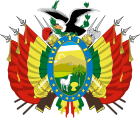1979 Bolivian general election
 |
|---|
|
|
General elections were held in Bolivia on 1 July 1979.[1] As no candidate in the presidential elections received a majority of the vote, the National Congress was required to elect a President. However, the Congress failed to elect a candidate after three ballots, and instead selected Senate leader Wálter Guevara to serve as Interim President for a year on 8 August.[2] Guevara was later overthrown by a military coup led by Alberto Natusch on 31 October. Fresh elections were held in June 1980.
Although the Democratic and Popular Union received the most votes in the Congressional elections, the Revolutionary Nationalist Movement-Alliance (A–MNR) won the most seats, largely as a result of the electoral system giving more seats to sparsely populated rural areas where the A–MNR was more popular.[3]
Background
General elections had previously been held in July 1978, the first since 1966, with several military coups taking place during the late 1960s and early 1970s.[1] Although Juan Pereda of the Nationalist Union of the People won the presidential elections, more votes were cast than there were registered voters.[4] After examining a number of allegations of fraud and other irregularities, the Electoral Court decided to annul the results on 20 July.[5] The following day, Pereda was installed as President following a military coup. Pereda himself was overthrown by yet another military coup in November, which saw General David Padilla assume the presidency,[6] promising to hold fresh elections in July the following year.[3]
Campaign
A total of 1,378 candidates contested the 144 seats in Congress.[3] Several alliances were formed for the elections:[7]
Results

| Party | Presidential candidate | Votes | % | Seats | |
|---|---|---|---|---|---|
| Chamber | Senate | ||||
| Democratic and Popular Union | Hernán Siles Zuazo | 528,696 | 36.0 | 38 | 8 |
| Revolutionary Nationalist Movement-Alliance | Víctor Paz Estenssoro | 527,184 | 35.9 | 48 | 16 |
| Nationalist Democratic Action | Hugo Banzer | 218,857 | 14.9 | 19 | 3 |
| Socialist Party-1 | Marcelo Quiroga Santa Cruz | 70,765 | 4.8 | 5 | 0 |
| Popular Alliance for National Integration | René Bernal Escalante | 60,262 | 4.1 | 5 | 0 |
| Indian Movement Túpac Katari | Luciano Tapia Quisbert | 28,344 | 1.9 | 1 | 0 |
| Bolivian Union Party | Walter Gonzales Valda | 18,976 | 1.3 | 1 | 0 |
| Workers' Vanguard Party | Ricardo Catoira | 16,560 | 1.1 | 0 | 0 |
| Invalid/blank votes | 223,856 | – | – | – | |
| Total | 1,693,500 | 100 | 117 | 27 | |
| Registered voters/turnout | 1,871,070 | 90.5 | – | – | |
| Source: Nohlen | |||||
By department
| Department | NDA | RNM | DPU | Others |
|---|---|---|---|---|
| Beni | 33.88% | 41.27% | 15.85% | 9.00% |
| Chuquisaca | 11.19% | 38.60% | 38.56% | 11.65% |
| Cochabamba | 18.56% | 27.91% | 29.20% | 24.34% |
| La Paz | 16.29% | 16.37% | 54.76% | 12.57% |
| Oruro | 9.19% | 39.97% | 31.31% | 19.52% |
| Pando | 23.65% | 56.50% | 12.31% | 7.54% |
| Potosi | 7.82% | 51.41% | 33.48% | 7.29% |
| Santa Cruz | 15.40% | 56.35% | 18.33% | 9.92% |
| Tarija | 14.78% | 65.92% | 14.70% | 4.60% |
| Source: Constituency-Level Election Archive | ||||
See also
References
- ^ a b Nohlen, D (2005) Elections in the Americas: A data handbook, Volume II, p133 ISBN 978-0-19-928358-3
- ^ Report on the situation of human rights in the Republic of Bolivia: Chapter IV: Political rights Archived February 1, 2012, at the Wayback Machine OAS
- ^ a b c 1979 IPU
- ^ Nohlen, p143
- ^ Waltraud Q Morales (2003) A brief history of Bolivia New York: Facts On File, p195
- ^ Nohlen, p157
- ^ Nohlen, p139
